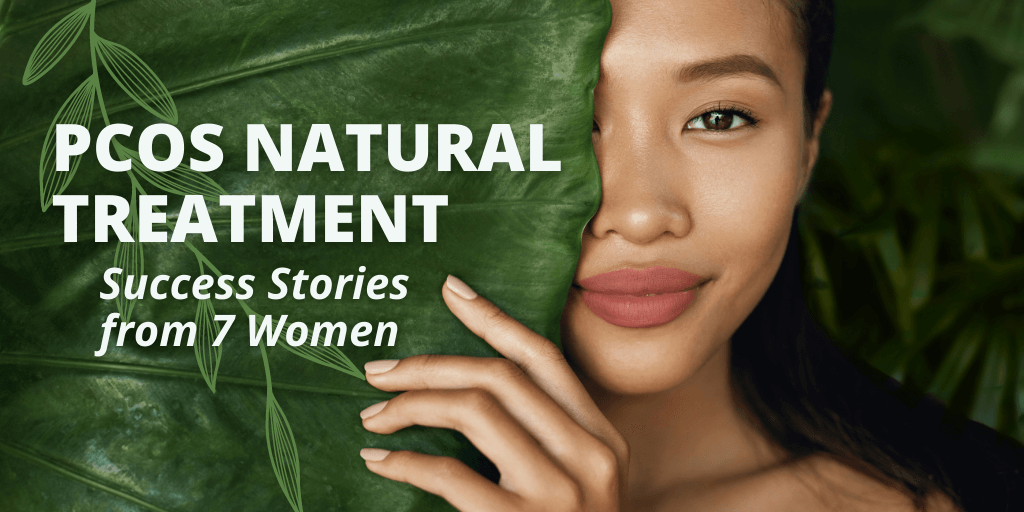[ad_1]
There’s a LOT of solid science supporting natural treatments for PCOS. But what’s more motivating is seeing what a PCOS diet and lifestyle can do in real life.
The following PCOS natural treatment success stories show you what’s possible. These are real-life stories from women just like you.
If you’re ready to make a similar transformation, then there’s no better place to start than my free 30-Day PCOS Diet Challenge. If 30 days seems like too big of a commitment to start with, then try this free 3-Day Meal Plan first.
What Every PCOS Success Story Shares
The primary mechanisms that cause all PCOS symptoms are well understood. Chronic inflammation, insulin resistance, and high androgen levels [1-6]. Having elevated androgens is largely a result of chronic inflammation and insulin resistance.
All these factors are modulated by the gut microbiome [7, 8].
People who beat PCOS know that they need to reduce inflammation and improve insulin sensitivity. While there are many ways to do this, they know that working on their gut health is a big part of the solution.
I explain the many ways you can do this in my PCOS natural treatment article. But a PCOS diet is key.
When you treat PCOS naturally, you don’t just lose weight or improve your reproductive health. You don’t just have more energy and feel better mentally. Your skin and hair don’t just improve. Given enough time, all your symptoms can resolve. It takes work to make the right diet and lifestyle changes. But the women below have led the way.
LeeAnne
When she first joined my free 30-Day PCOS Diet Challenge, LeeAnne was a complicated mess of health issues. She was on so many medications, and she still felt terrible all the time. As it turned out, the fix was quite simple. The transformation in LeeAnne’s health after changing her diet is one of the most remarkable I’ve seen to date.
You can read LeeAnne’s full story here.
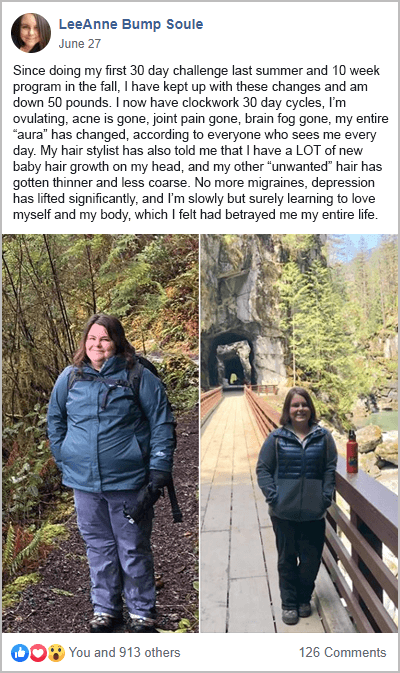
Raynetta
Raynetta is a high-energy woman who put her determination to good use. After a long battle with both infertility and other common PCOS health issues, Raynetta was ready for a change. She hit almost all the usual obstacles along the way. After several years though, she’d realized a new healthy normal. She lost 50 pounds, overcame her symptoms, and finally had a baby.
Learn more about Raynetta’s story here.
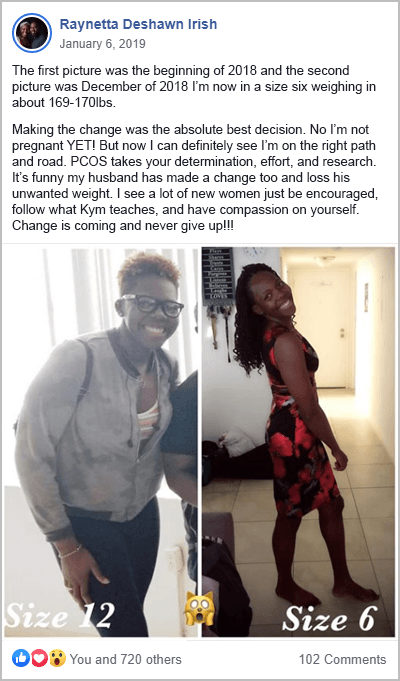
Kristin
Kristin took a long-term approach to adopting a PCOS-friendly diet. She didn’t do everything perfectly, which is completely normal. Instead, she kept doing things a little bit better over the weeks and months following my 30-Day Challenge. After a year, she’d lost 47 pounds and dropped six pant sizes.
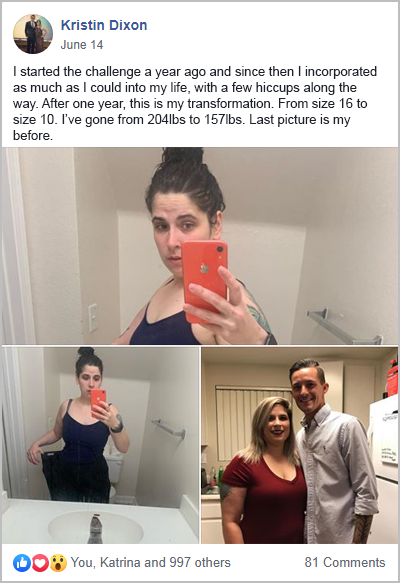
Jamie
Jamie has been a great inspiration in our PCOS support group. She used my Challenge as a pivot point in her journey through infertility. She started seeing results shortly after changing her diet. Jamie’s periods became more regular, and she lost 50 pounds. Within six months or so, she fell pregnant naturally overcoming four years of infertility.
You can read more about Jamie’s journey here.
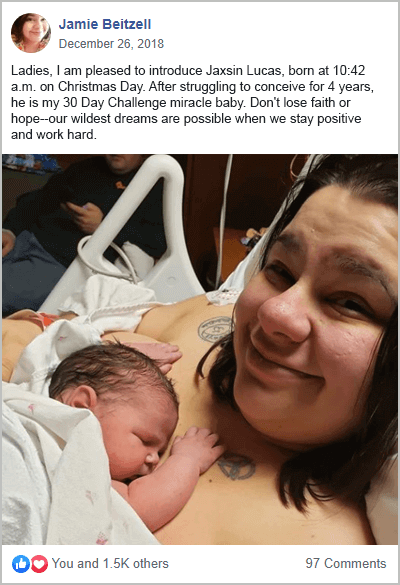
Valerie
Valerie was motivated to change her diet because she was concerned about her metabolic health. She was insulin-resistant and had a family history of diabetes. After taking part in my 30-Day Challenge and then pushing herself further with my 10-Week Program, Valerie saw the results in her bloodwork. Within half a year her A1C levels fell within normal ranges.
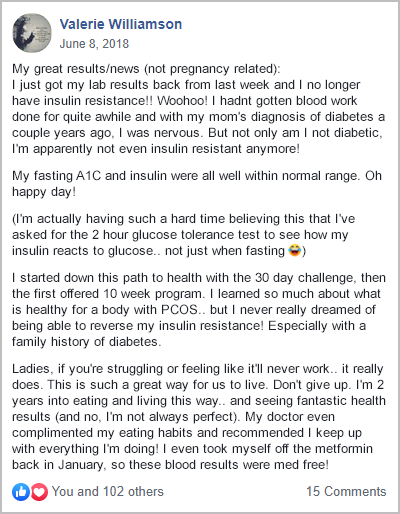
Kendall
Kendall is a great example of how a little information can go a long way. After taking part in my 30-Day Challenge, Kendall figured out how to make a PCOS diet part of her lifestyle. This wasn’t easy, but over three years, she lost 110 pounds of excess weight. She’s since gone on to have two healthy children that were conceived naturally.
Learn more about how Kendall did it here.
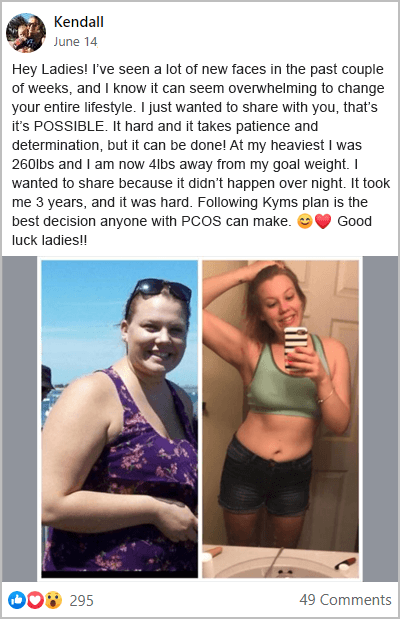
Krystal
Krystal shows that beating PCOS need not be a years-long project for some lucky people. She was starting to lose hope that she’d ever have a baby. But a week after completing my 30-Day Challenge, Krystal was amazed to find she’d fallen pregnant naturally. It’s not clear how much of a role her diet changes played in this case. But Krystal was convinced it helped a lot.
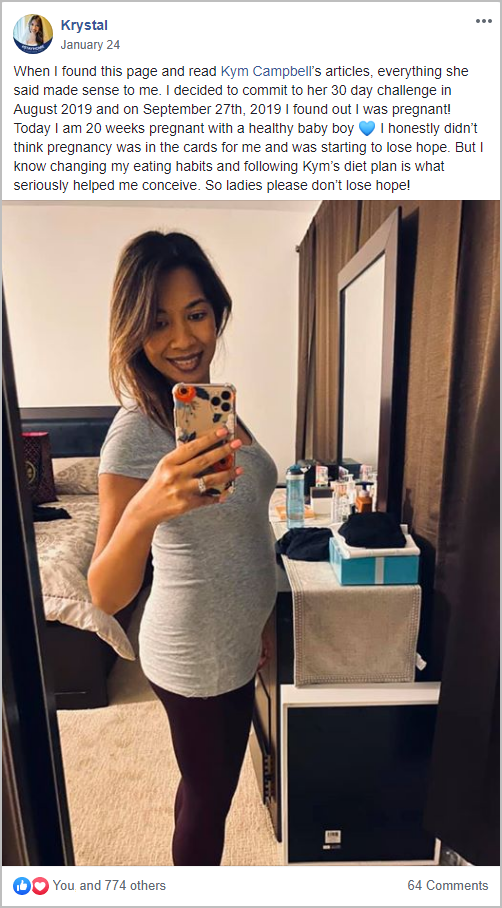
The Bottom Line
PCOS affects us all differently. But the underlying drivers of all symptoms are all the same. From a what-can-I-do-about-it perspective, there are three things to know. You need to reduce inflammation, improve insulin regulation, and heal your gut. Switching to a PCOS diet is the best way to achieve this.
For help putting proven diet changes into practice, join my next 30-Day PCOS Diet Challenge. This free program runs four times a year. If you want to get started today, download this free 3-Day Meal Plan for a sample PCOS meal plan and some great easy-to-make recipes to get you started.
Author
Combining rigorous science and clinical advice with a pragmatic approach to habit change, Kym is on a mission to show women with PCOS how to take back control of their health and fertility. Read more about Kym and her team here.
References
1Carvalho, L.M.L., et al., Polycystic Ovary Syndrome as a systemic disease with multiple molecular pathways: a narrative review. Endocr Regul, 2018. 52(4): p. 208-221.
2González, F., Inflammation in Polycystic Ovary Syndrome: underpinning of insulin resistance and ovarian dysfunction. Steroids, 2012. 77(4): p. 300-5.
3González, F., et al., Hyperandrogenism sensitizes mononuclear cells to promote glucose-induced inflammation in lean reproductive-age women. Am J Physiol Endocrinol Metab, 2012. 302(3): p. E297-306.
4Popovic, M., G. Sartorius, and M. Christ-Crain, Chronic low-grade inflammation in polycystic ovary syndrome: is there a (patho)-physiological role for interleukin-1? Seminars in Immunopathology, 2019. 41(4): p. 447-459.
5Rudnicka, E., et al., Chronic Low Grade Inflammation in Pathogenesis of PCOS. Int J Mol Sci, 2021. 22(7).
6Wang, J., et al., Hyperandrogenemia and insulin resistance: The chief culprit of polycystic ovary syndrome. Life Sciences, 2019. 236.
7Tremellen, K. and K. Pearce, Dysbiosis of Gut Microbiota (DOGMA)–a novel theory for the development of Polycystic Ovarian Syndrome. Med Hypotheses, 2012. 79(1): p. 104-12.
8He, F.F. and Y.M. Li, Role of gut microbiota in the development of insulin resistance and the mechanism underlying polycystic ovary syndrome: a review. J Ovarian Res, 2020. 13(1): p. 73.
Combining rigorous science and clinical advice with a pragmatic approach to habit change, Kym is on a mission to show women with PCOS how to take back control of their health and fertility. Read more about Kym and her team here.
[ad_2]
Source link

